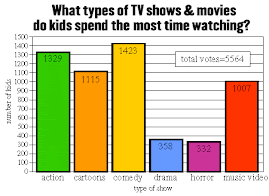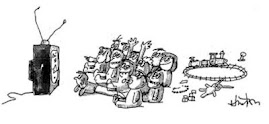1. Ratings for tv shows are optional and only appear for a few seconds at the beginning of a show.
2. The average child will have witnessed 18,000 murders, robberies, bombings, smugglings, assaults and beatings
3. One out of every three children/teens watch tv shows that are aimed at adults and feature adult content.
4. Less than 4% of tv shows advisories, such as viewer discretion is advised.
5. 61% of programs on tv have some form of violence
6. 25% of all violent behaviors seen on tv invovle a gun
7. Tv focuses violent tv shows towards children and teens
8. 75% of all violent scenes feature no immediate punishment or condemnation for violence
9. 45% of programs feature bad charachters who are never or rarely punished
10. 1/3 of tv shows present violence unrealistically
Friday, March 28, 2008
Thursday, March 27, 2008
What the experts say
1. "61% of programs on TV have some form of violence" - The National Television Study
2. "By the age of 18, the average young person has seen 200,000 acts of violence on television alone" - The American Academy of Pediatrics
3. "75% of all violent scenes [on television] feature no immmediate punishment of condemation for violence." - The National Television Study
4. "45% of programs feature bad characters who are never or rarely punished" - The National Television Study
5. "Teenagers and young adults who watched more than one hour of television daily were more likely to commit violent crimes and engage in other forms of agressive behavior" - Dr. Jeffrey G. Johnson of Columbia University/conducted study
6. "Reducing kids' exposure to graphic violence can help keep them out of the correction system" - The American Psychological Association Commission of Violence
7. "Those who are eexposed to this kind of violence develop an exaggerated sense of fear, anxiety, insecurity, dependence, paranoia, and mistrust of others" - Dr. George Gerbner of the University of Pennsylvania
8. "The single best predictor of on how agressive these people were at 18 was the violence they viewed at age 8" Dr. Eron of the University of Illinois/conducted study
9. "Media violence is a factor in children's agressive behavior and an effort should be made to curb the adverse effects" Office of the Surgeon General of the United States
10. "1/2 of the violent interactions on tv have no pain or harm on victims" - National Television Study
2. "By the age of 18, the average young person has seen 200,000 acts of violence on television alone" - The American Academy of Pediatrics
3. "75% of all violent scenes [on television] feature no immmediate punishment of condemation for violence." - The National Television Study
4. "45% of programs feature bad characters who are never or rarely punished" - The National Television Study
5. "Teenagers and young adults who watched more than one hour of television daily were more likely to commit violent crimes and engage in other forms of agressive behavior" - Dr. Jeffrey G. Johnson of Columbia University/conducted study
6. "Reducing kids' exposure to graphic violence can help keep them out of the correction system" - The American Psychological Association Commission of Violence
7. "Those who are eexposed to this kind of violence develop an exaggerated sense of fear, anxiety, insecurity, dependence, paranoia, and mistrust of others" - Dr. George Gerbner of the University of Pennsylvania
8. "The single best predictor of on how agressive these people were at 18 was the violence they viewed at age 8" Dr. Eron of the University of Illinois/conducted study
9. "Media violence is a factor in children's agressive behavior and an effort should be made to curb the adverse effects" Office of the Surgeon General of the United States
10. "1/2 of the violent interactions on tv have no pain or harm on victims" - National Television Study
Wednesday, March 19, 2008
Second Argument
My second argument deals with the glamorization of television violence. Almost all TV shows that contain violence are guilty of using glamorization. These shows make violence seem acceptable and desirable. They use attractive characters that viewers begin to admire, and have these characters use violence that doesn't end in a consequence. Accoriding to the National Television Study, nearly 1/2 of violent interactions shown on tv have no pain or harm associated with violence. Also, 1/3 of the violence was presented in an "unrealistic fashion". This glamorized violence shown on tv legitimizes violence, making it seem acceptable and something to envy. Viewers begin to think that violence is not a big deal and become comfortable with it. It has been said that the 1999 massacre at Columbine High School was due to the glamorization of guns and violence; making the effect television has on teens more evident than ever.
Television glamorizes violence, making it seem acceptable. It is necessary to down violence in order to reteach viewers right from wrong.
Television glamorizes violence, making it seem acceptable. It is necessary to down violence in order to reteach viewers right from wrong.
Tuesday, March 18, 2008
Strongest Supporting Argument
Television violence should be toned down because of the major effects it has on its viewers. 75% of television programs have some form of violence in them, making them almost impossible to avoid. Although they seem harmless, it had been proven that viewing violent shows has major negetive effects on viewers. Watching violent tv shows as young as 8 can lead to agressive behavior as a teen and adult. Adults who watched violent tv shows as children are likely to be involved in theft or even murder. Viewing violent shows for only an hour can also lead to violence and hostility towards others, anti-social behavior, insecurity, fear, and the inability to trust others. It is clear that violent tv shows have a negetive impact on viewers. Doesn't it make sense to tone it down?
Sunday, March 16, 2008
Pro and Con
As with all controversial issues, the is a pro and a con side to the question: Should Violence On TV be reduced?
On the con side, there is the argument that parents should control what their children watch on tv or listen to on the radio. If a parent believes that his or her child will be affected by the violence, they shouldn't expose the children to it. People on this side also believe that a child's family and social life as well as real life role models have more of an impact on a child than the media. For example, a child that exposed to violent real-life situations is more likely to be violent than a child that watches violent tv shows. They also argue that the topic is simply too complex and any research done isn't reliable.
On the pro side, there is the argument that media violence surrounds children and it is the prominent reason for youth violence. There are many tv shows, such as Power Rangers and Spiderman, that glorify heros who use violence. Children often look up to these characters and desire to be like them. There is also an abundance of violence in movies, most of which is acted out by famous celebrities. In the end, the violent characters are almost never punished for their violent actions. When it comes to sensorship, violence is often passed as with an okay. Children get the wrong image from these movies and tv shows and begin to believe that violence is good. When a child is young, their views are based on what's around them. If they are constantly exposed to violence, they will think violence is a normal part of life. There is also the argument that television has a major impact on it's viewers as displayed by the use of advertisements. If tv didn't play a major roll in the wiewers' lives, advertisements wouldn't be useful.
I agree with the pro side. I feel that children are exposed to television violence too often, and that these shows should at least have a viewer disgretion warning.
On the con side, there is the argument that parents should control what their children watch on tv or listen to on the radio. If a parent believes that his or her child will be affected by the violence, they shouldn't expose the children to it. People on this side also believe that a child's family and social life as well as real life role models have more of an impact on a child than the media. For example, a child that exposed to violent real-life situations is more likely to be violent than a child that watches violent tv shows. They also argue that the topic is simply too complex and any research done isn't reliable.
On the pro side, there is the argument that media violence surrounds children and it is the prominent reason for youth violence. There are many tv shows, such as Power Rangers and Spiderman, that glorify heros who use violence. Children often look up to these characters and desire to be like them. There is also an abundance of violence in movies, most of which is acted out by famous celebrities. In the end, the violent characters are almost never punished for their violent actions. When it comes to sensorship, violence is often passed as with an okay. Children get the wrong image from these movies and tv shows and begin to believe that violence is good. When a child is young, their views are based on what's around them. If they are constantly exposed to violence, they will think violence is a normal part of life. There is also the argument that television has a major impact on it's viewers as displayed by the use of advertisements. If tv didn't play a major roll in the wiewers' lives, advertisements wouldn't be useful.
I agree with the pro side. I feel that children are exposed to television violence too often, and that these shows should at least have a viewer disgretion warning.
Thursday, March 13, 2008
Overview
Does violence in the media have an effect on children?
For my research paper, i decided to write about violence in the media. There has been much controversy over whether or not the violence portrayed in movies, television, and video games have an affect on children. On one side, there is the belief that the glorified violence in the media leads children to become violent and angry. On the other side, there is the belief that violence in the media has little or no effect on children compared to real life situations; such as the child's family and social life.
I selected this issue because violence is more and more commonly seen everyday, and consequently, has become something that is relatively accepted. I feel that the violence that is glorified in the media is often seen as entertainment, as opposed to something that's wrong and should come with punishment. It is very possible that children see violent characters in movies and think that they want to be like that. Violence in the media should be less glorified and more toned down.
I selected this issue because violence is more and more commonly seen everyday, and consequently, has become something that is relatively accepted. I feel that the violence that is glorified in the media is often seen as entertainment, as opposed to something that's wrong and should come with punishment. It is very possible that children see violent characters in movies and think that they want to be like that. Violence in the media should be less glorified and more toned down.
Subscribe to:
Posts (Atom)

